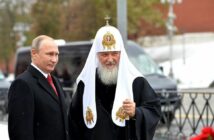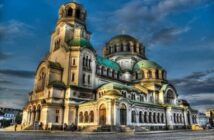Source: Peter Anderson, Seattle USA
On January 12, the Russian news agency Novosti reported that Archpriest Alexey Uminsky failed to appear for the second time before a Moscow diocesan court (Link). Novosti interviewed Archpriest Vladislav Tsypin, deputy chairman of the diocesan court. Tsypin stated: Yesterday we waited for him [Uminsky] for 4-5 hours. He is being summoned to court due to failure to comply with the instructions of the hierarchy, the Patriarch, to read a prayer for Holy Rus.’ This quotation is the most authoritative information to date that the current proceedings against Uminsky are based on his failure to recite this prayer. The full text of the prayer, composed by Patriarch Kirill in September 2022, can be read at Link. Among other petitions, the prayer requests God to “give us victory” and to “confirm the warriors and all the defenders of our Fatherland.” On January 3, Patriarch Kirill had issued a decree releasing Uminsky as rector of the Church of the Life-Giving Trinity in Khokhly [center of Moscow]and prohibiting him from serving in the priesthood until the end of proceedings before the Moscow diocesan court (Link).
The Church of the Life-Giving Trinity is more than 400 years old. Uminsky has been rector of the Church since 1993. He is a well-known personality and has appeared often on television. The very popular religious website Pravmir gives his biography and links to some of his many articles appearing on the website (Link). His videos on YouTube seem to be countless (Link). He has hosted various television series, including the popular program “Orthodox Encyclopedia.”
The action against Uminsky has been big news in Russia. The following are long articles from some of the more liberal publications: Link 1; Link 2 (article by Sergei Chapnin). The following is an article from a very conservative website applauding the action against Uminsky (Link). A petition to Patriarch Kirill has been posted online requesting him to reconsider the ban imposed on Uminsky. The following is an excerpt from the petition: The decree banning priest Alexei Uminsky from serving will deprive thousands of people of spiritual support. This is a great tragedy for many believers, for children’s hospice patients, for hundreds of prisoners and thousands of homeless people. In our difficult times, it is important to preserve the opportunity for people to receive spiritual support from a beloved and important priest. To date, more than 10,000 persons have listed their names on the online petition (Link).
On January 11 the website of the Union of Orthodox Journalists published an article arguing that the act of Patriarch Kirill requiring by his own authority the recitation of the prayer for Holy Rus’ was actually a form of “papism.” (Link) The article states: In this sense, Father Alexey Uminsky, like any other priest, had every right not to read the “special” prayer for the reasons already indicated: it is not in the Service Book, it does not have conciliar origin, it is not approved by the Holy Synod, but is the desire of one person. The article also states: To ban a priest from ministry simply for refusing to read a prayer that contradicts his ethical or even political views, clearly has nothing to do with the Kingdom of Heaven, and therefore brings enormous harm to the Church.
The action against Uminsky is not the first time that the Moscow Patriarchate has taken action against a cleric for protesting or not supporting the position of the Russian Church with respect to Ukraine. As you recall, Father Ioann Koval, a priest in the Lublino district of Moscow, was found guilty of disobedience by the Moscow diocesan court for repeatedly substituting the word “peace” for the word “victory” in the prayer for Holy Rus’ (Link). The diocese court ruled that Koval should be defrocked. Last June, the Holy Synod of the Ecumenical Patriarchate lifted the penalty of defrocking and restored Koval to the priestly ranks. Koval is now a priest of the Ecumenical Patriarchate apparently serving in Antalya, Turkey. Andrey Kuraev, now living in Prague, is compiling on his blog a list of the priests of the Moscow Patriarchate who have been subject to adverse actions because of their positions with respect to Ukraine (Link) (entry of January 11). So far, there are ten priests on the list. Of the listed priests, Uminsky is by far the most well-known.
On December 27, 2023, the Orthodox feast of St. Stephen, Ecumenical Patriarch Bartholomew presided over the Divine Liturgy at the Church of St. Stephen, used by the Bulgarian-speaking Orthodox community in the Balat district of Istanbul (Link). It was at the Church of St. Stephen in 1860 that Bulgarian bishop Hilarion rejected dependence on the Ecumenical Patriarchate and announced an independent Bulgarian church organization. It was not until 1945 that the Ecumenical Patriarchate recognized the autocephaly of the Bulgarian Church and ceased considering it to be a schismatic church. Subsequently, the Church of St. Stephen came under the jurisdiction of the Ecumenical Patriarchate. However, the Liturgy last month was the first occasion that an ecumenical patriarch has ever celebrated a service in this church. In the homily on December 27, Patriarch Bartholomew used this occasion to stress that “only in unity and harmony does the Church fulfill its God-given mission to the world.” (Link) The homily included the following remarks:
Today from the sanctuary of this Temple, once a point of problematic reference, we send to everyone an invitation of love and fellowship in unity, not only theoretically in the divine Eucharist, but in all aspects of church life. We declare our desire for direct contact with all of the local Orthodox Churches and our willingness at the same time to contribute to finding solutions to everything that concerns the Orthodox body, always within the handed-down principles, terms and limits of the ecclesiology of the Eastern Orthodox Church.
In my opinion, this is an interesting invitation. One must wait and see whether there is a response from other Local Orthodox Churches.
In Ukraine, Ruslan Stefanchuk, Chairman of the Verkhovna Rada of Ukraine, gave on January 5 a long interview to Interfax – Ukraine (Link). He confirmed that he has refused to send the controversial Draft Law 8371 to the Venice Commission. He was asked whether the Rada would take into account before the second reading of Draft Law 8371 the concerns about the Draft Law expressed by Volker Türk, the United Nations High Commissioner for Human Rights. The High Commissioner had stated on December 19 that the “proposed restrictions to the right to freedom of religion [in Draft Law 8371]do not appear to comply with international human rights law.” See Link. Stefanchuk did not directly answer this question. However, he did state: Therefore, I would like that in this particular case, if there are any reservations, let them make them in some form that can be added to the existing draft law. And for that you need to read it. That is, I want the logic of the discussion and criticism to begin with the fact of familiarization with the text of this or that legislative act. And I will be more than happy to consider all of these suggestions for anything. It is also reported that the Rada’s Committee on Humanitarian and Information Policy hopes to submit the Draft Law to the full Rada for the second reading in February (Link).
The UOC has retained the law firm of Amsterdam & Partners (offices in London and Washington, DC) to represent its interests on the international stage with respect to the actions being taken by the Ukrainian government against the UOC. The law firm has established a website with the most recent news relating to this topic (Link). The firm has also authored a 25-page “white paper” entitled “Freedom of Religion Under Attack in Ukraine.” (full text) The “white paper” is quite specific and includes many footnotes. The following is a 6-minute video available on the firm’s website (Link).
In other news relating to Ukraine, the UOC has issued a statement on December 28 that the ruling UOC bishop of Kherson remains responsible for the entire diocese including the parts now occupied by Russia and that changes in the structure of the diocese can only be made by the UOC (Link). As you recall, the Holy Synod of the Moscow Patriarchate decided on December 27 to create a new diocese consisting of the part of the Kherson diocese presently under the control of the Russian Federation. According to this Moscow decision, the new diocese is placed under the temporary administration of one of the Crimean bishops who has left the UOC (Link) (entry 120). Although the statement of the UOC contradicts the decision of the Holy Synod in Moscow, it is a mild statement and makes no direct reference to the Moscow decision itself. The mildness of the statement is perhaps due to the desire of the UOC not to irritate the Moscow Patriarchate unnecessarily for fear that the Patriarchate might declare the UOC to be a “schismatic” church. From the viewpoint of many in the UOC, being a “schismatic” church would mean that the UOC’s sacraments are no longer valid.
Peter Anderson, Seattle USA



